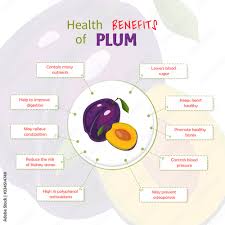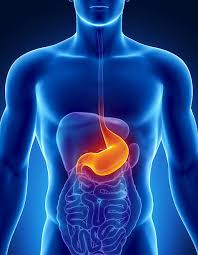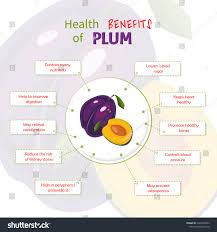Introduction to Plum Benefits
Plums are not just a delicious and juicy fruit; they offer many health benefits that can significantly enhance your overall well-being. As a member of the Rosaceae family, plums come in various colors and flavors, each bringing its unique set of nutrients and advantages. Whether you’re enjoying them fresh or dried, the plum benefits on health are extensive and well worth incorporating into your daily diet.
Overview of Plums
Plums are stone fruits containing a hard pit surrounded by soft, edible flesh. They come in different varieties, including red, purple, yellow, and green, each with a distinct taste and texture. From being eaten fresh to being dried into prunes, plums are versatile and can be used in numerous culinary applications.
General plum benefits on Health

Plums are packed with essential vitamins, minerals, and antioxidants, making them a valuable addition to a healthy diet. Regular consumption of plums can aid in digestion, improve heart health, strengthen bones, and provide numerous other health benefits. Their natural sweetness and low-calorie content make them an excellent snack for those looking to maintain a healthy weight while satisfying their sweet tooth.
Nutritional Profile of Plums
To truly appreciate the health benefits of plums, it’s important to understand their nutritional composition. Plums are rich in a variety of essential nutrients that support overall health and well-being.
Vitamins and Minerals
Plums are a great source of vitamins such as vitamin C, which boosts the immune system, and vitamin K, which is crucial for blood clotting and bone health. They also provide vitamin A, important for vision and skin health, and several B vitamins that aid in energy production and brain function. Additionally, plums contain minerals like potassium, magnesium, and phosphorus, which support heart health, muscle function, and bone strength.
Macronutrients
In terms of macronutrients, plums are low in calories and contain a good amount of dietary fiber. This makes them an excellent choice for those looking to maintain or lose weight. The natural sugars in plums provide a quick energy boost without causing a significant spike in blood sugar levels, making them suitable for people with diabetes.
Plum Benefits for Digestive Health

One of the most well-known plum benefits is their positive impact on digestive health. The fiber content in plums helps regulate bowel movements and prevent constipation, promoting a healthy digestive system.
Fiber Content
Plums are high in dietary fiber, particularly soluble fiber, which helps to soften stool and make it easier to pass. This can be especially beneficial for individuals who suffer from constipation. Additionally, the fiber in plums helps to promote a feeling of fullness, which can aid in weight management by reducing overall calorie intake.
Prebiotic Effects
The fiber in plums also acts as a prebiotic, feeding the beneficial bacteria in your gut. A healthy gut microbiome is crucial for overall digestive health and can help prevent a variety of digestive issues. By supporting the growth of good bacteria, plums can contribute to a balanced and healthy digestive system.
Plum Benefits for Heart Health

Heart health is another area where plums can make a significant impact. The antioxidants and other nutrients found in plums can help protect the heart and improve cardiovascular health.
Antioxidants and Their Role
Plums are rich in antioxidants, such as phenolic compounds and flavonoids, which help to reduce inflammation and protect the heart from oxidative stress. These antioxidants can help to lower the risk of heart disease by preventing the oxidation of LDL cholesterol, which is a key factor in the development of atherosclerosis.
Impact on Blood Pressure
The potassium content in plums is another heart-healthy benefit. Potassium helps to regulate blood pressure by balancing the effects of sodium in the body. Consuming foods rich in potassium, like plums, can help to lower blood pressure and reduce the risk of hypertension and stroke.
Plum Benefits for Bone Health
Strong bones are essential for a healthy life, and plums can play a role in maintaining bone density and preventing osteoporosis.
Essential Nutrients for Bones
Plums contain several nutrients that are important for bone health, including vitamin K, phosphorus, magnesium, and potassium. These nutrients work together to strengthen bones and maintain their density. Vitamin K, in particular, helps to improve calcium absorption and bone mineralization.
Studies on Bone Density
Several studies have shown that regular consumption of prunes (dried plums) can help to increase bone density and reduce the risk of osteoporosis, especially in postmenopausal women. This makes plums a valuable addition to the diet for anyone concerned about maintaining strong and healthy bones.
Antioxidant Plum Benefits
The antioxidant properties of plums are one of their most notable benefits. These antioxidants help to protect the body from damage caused by free radicals and reduce the risk of chronic diseases.
Types of Antioxidants in Plums
Plums contain a variety of antioxidants, including phenolic compounds, flavonoids, and vitamin C. These antioxidants work together to neutralize free radicals and protect cells from oxidative damage. The skin of the plum, in particular, is rich in these beneficial compounds.
Benefits of Antioxidants
Antioxidants are crucial for maintaining overall health and preventing chronic diseases such as heart disease, cancer, and diabetes. By reducing inflammation and oxidative stress, the antioxidants in plums can help to support a healthy immune system and protect against a wide range of health issues.
Plum Benefits for Blood Sugar Regulation
Managing blood sugar levels is essential for overall health, especially for individuals with diabetes. Plums can help to regulate blood sugar levels and prevent spikes and crashes.
Glycemic Index of Plums
Plums have a low glycemic index, which means they do not cause a rapid spike in blood sugar levels when consumed. This makes them a suitable fruit for individuals managing diabetes or those looking to maintain stable blood sugar levels.
Benefits for Diabetics
The fiber content in plums also helps to slow the absorption of sugar into the bloodstream, further aiding in blood sugar regulation. Including plums in a balanced diet can help diabetics manage their condition more effectively and prevent complications related to blood sugar imbalances.
Incorporating Plums into Your Diet
Incorporating plums into your diet is easy and can be done in various delicious ways. Whether you prefer them fresh or dried, there are numerous ways to enjoy the health benefits of plums.
Fresh Plum benefits
Fresh plums are a refreshing and nutritious snack that can be enjoyed on their own or added to various dishes. Try adding sliced plums to your morning cereal or yogurt, or use them to top salads for a burst of sweetness and color. Fresh plums can also be blended into smoothies or used to make sauces and jams.
Dried Plum benefits(Prunes)
Dried plums, also known as prunes, are a convenient and healthy snack that can be enjoyed anytime. They can be added to baked goods, such as muffins and bread, or used to enhance savory dishes like stews and salads. Prunes are also great for making energy bars or trail mix.
Recipe Ideas
Countless recipes incorporate plums, from desserts to main dishes. Try making a plum tart or a plum chutney to serve with meats. Grilled plums make a delicious and unique addition to summer barbecues, while plum compote can be used to top pancakes, waffles, or ice cream.
This detailed content on the health benefits of plums covers their nutritional profile, various health advantages, ways to incorporate them into your diet, and more. Each section is designed to give readers a comprehensive understanding of how plums can contribute to a healthy lifestyle.

